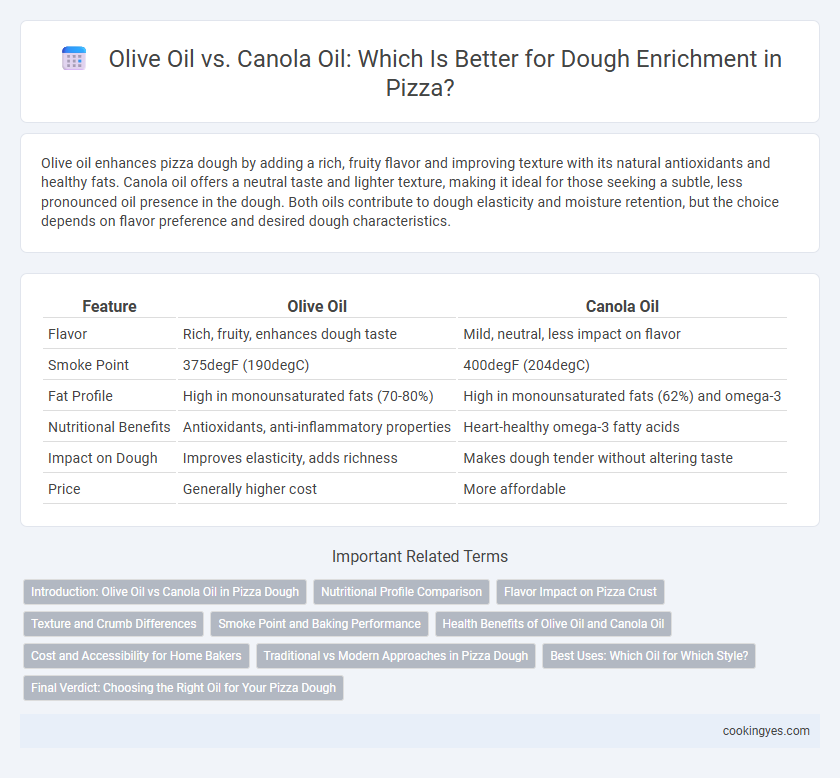Olive oil enhances pizza dough by adding a rich, fruity flavor and improving texture with its natural antioxidants and healthy fats. Canola oil offers a neutral taste and lighter texture, making it ideal for those seeking a subtle, less pronounced oil presence in the dough. Both oils contribute to dough elasticity and moisture retention, but the choice depends on flavor preference and desired dough characteristics.
Table of Comparison
| Feature | Olive Oil | Canola Oil |
|---|---|---|
| Flavor | Rich, fruity, enhances dough taste | Mild, neutral, less impact on flavor |
| Smoke Point | 375degF (190degC) | 400degF (204degC) |
| Fat Profile | High in monounsaturated fats (70-80%) | High in monounsaturated fats (62%) and omega-3 |
| Nutritional Benefits | Antioxidants, anti-inflammatory properties | Heart-healthy omega-3 fatty acids |
| Impact on Dough | Improves elasticity, adds richness | Makes dough tender without altering taste |
| Price | Generally higher cost | More affordable |
Introduction: Olive Oil vs Canola Oil in Pizza Dough
Olive oil enhances pizza dough with a rich, fruity flavor and contributes to a tender, chewy texture due to its monounsaturated fats and antioxidants. Canola oil offers a neutral taste and light texture, making it suitable for those seeking a subtle dough enrichment without overpowering the pizza's toppings. Both oils improve dough elasticity and moisture retention, but olive oil is favored for its distinctive aroma and health benefits, while canola oil is valued for its mildness and affordability.
Nutritional Profile Comparison
Olive oil contains higher levels of monounsaturated fats and antioxidants like vitamin E and polyphenols, which contribute to heart health and reduce inflammation. Canola oil offers a balanced ratio of omega-3 and omega-6 fatty acids with lower saturated fat content, making it a better option for lowering bad cholesterol. Both oils enhance dough texture, but olive oil provides additional nutrients beneficial for overall wellness.
Flavor Impact on Pizza Crust
Olive oil enhances pizza crust with a rich, fruity aroma and a subtle peppery undertone that complements tomato sauce and herbs, creating a more traditional Italian flavor profile. Canola oil provides a neutral taste, allowing other ingredients to shine without altering the crust's natural flavor. Choosing olive oil for dough enrichment results in a more flavorful, aromatic crust, while canola oil maintains a lighter, less pronounced taste.
Texture and Crumb Differences
Olive oil enhances pizza dough by creating a tender crumb with a slightly denser texture and a rich, aromatic flavor, promoting a moist interior and crispier crust. Canola oil produces a lighter, airier crumb with a more neutral taste, resulting in a softer texture and less pronounced crust crispness. The choice between olive oil and canola oil significantly influences the dough's elasticity, crumb structure, and overall mouthfeel in pizza baking.
Smoke Point and Baking Performance
Olive oil, with a smoke point around 375degF (190degC), offers robust flavor and slightly lower heat tolerance, making it ideal for traditional pizza dough enriched with a rich, aromatic profile. Canola oil has a higher smoke point of approximately 400degF (204degC), providing better heat stability and a neutral taste that supports a softer, more pliable dough texture during high-temperature baking. Choosing between olive oil and canola oil depends on balancing desired flavor intensity against baking temperature requirements and dough elasticity.
Health Benefits of Olive Oil and Canola Oil
Olive oil is rich in monounsaturated fats and antioxidants such as vitamin E and polyphenols, contributing to heart health and anti-inflammatory benefits when used in pizza dough. Canola oil contains a balanced ratio of omega-3 and omega-6 fatty acids, supporting cardiovascular health and reducing bad cholesterol levels. Choosing olive oil enhances flavor and provides potent health-promoting compounds, while canola oil offers a neutral profile with essential fatty acids beneficial for overall wellness.
Cost and Accessibility for Home Bakers
Olive oil offers rich flavor and health benefits but tends to be more expensive and less accessible than canola oil for home bakers. Canola oil provides a budget-friendly, widely available option that enhances dough texture without overpowering taste. For cost-conscious bakers, canola oil is often the preferred choice, balancing affordability and ease of use.
Traditional vs Modern Approaches in Pizza Dough
Traditional pizza dough recipes often rely on olive oil for its rich flavor and natural antioxidants that enhance the dough's texture and aroma. Modern approaches increasingly incorporate canola oil, prized for its neutral taste and higher smoke point, which supports consistency and flexibility in commercial pizza production. Nutritional profiles differ as well; olive oil offers heart-healthy monounsaturated fats, while canola oil provides a balanced mix of omega-3 and omega-6 fatty acids, influencing the choice based on health and culinary preferences.
Best Uses: Which Oil for Which Style?
Olive oil enhances pizza dough with a rich, fruity flavor and is ideal for traditional Neapolitan and Mediterranean-style pizzas, creating a tender crust with a slightly crisp edge. Canola oil offers a neutral taste and high smoke point, making it suitable for thicker, pan-style pizzas where a softer, chewier crust is preferred without altering the dough's flavor. Selecting olive oil versus canola oil depends on desired dough texture and flavor profile aligned with specific pizza styles and baking methods.
Final Verdict: Choosing the Right Oil for Your Pizza Dough
Olive oil enhances pizza dough with rich flavor and a tender crumb, while canola oil offers a neutral taste and a lighter texture. Nutritionally, olive oil provides beneficial monounsaturated fats and antioxidants, making it a healthier option compared to canola oil's higher polyunsaturated fat content. For authentic, flavorful pizza dough, olive oil is the preferred choice, but canola oil suits those seeking a milder flavor profile and lower cost.
Olive oil vs Canola oil for dough enrichment Infographic

 cookingyes.com
cookingyes.com